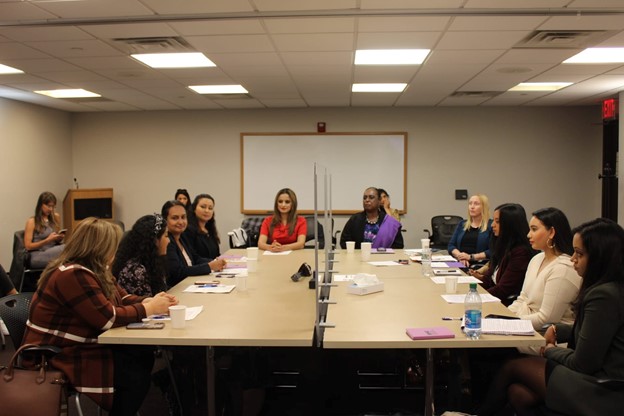Assemblywoman Jenifer Rajkumar Gives Keynote Speech at Mayor’s Office Roundtable on Domestic Violence in South Asian Diaspora
First South Asian woman elected to New York State office joins advocates of domestic violence survivors in South Asian community
South Queens, NY – On Tuesday, Assemblywoman Jenifer Rajkumar (D-AD 38) joined the Mayor’s Office to End Domestic and Gender-Based Violence at the Queens Family Justice Center for a media roundtable on addressing domestic violence in the South Asian diaspora. The Assemblywoman delivered the keynote speech to an audience of members of the press and advocates for South Asian and Indo-Caribbean women.
ENDGBV Commissioner Cecile Noel said: “It’s been my great privilege to work alongside [Assemblywoman Rajkumar] to help survivors of domestic and gender-based violence. As a Queens resident myself, I am so happy that her voice is in our State Assembly, that we have an advocate who truly understands survivors and the challenges that they face.”
A transcript of the Assemblywoman’s speech in its entirety is enclosed.
###
Transcript of Assemblywoman Rajkumar’s Speech
Thank you, Commissioner Cecile Noel of Mayor Eric Adams’ Office to End Domestic and Gender-Based Violence. My name is Jenifer Rajkumar, and I am the first South Asian woman ever elected to New York State Office, and the first South Asian elected to government office in our great city. When I ran for this office, people said, “Jenifer you’re a nice girl. You have no shot.” But we won, and now as the first South Asian woman to represent this district, my office is a sanctuary for any women fleeing violence and abuse. My office is a launchpad for women seeking to empower themselves and for the vulnerable looking to become strong.
Let me start by saying domestic violence has no place in South Asian culture. Our culture celebrates the divine feminine and the strength of women. We have Goddesses like Laxmi and Durga embedded in our culture. This week, girls dressed as Laxmi graced Richmond Hill’s Liberty Avenue for Diwali. New Yorkers hailing from India, Bangladesh and Pakistan are accustomed to woman prime ministers and heads of state. Incredible activists and organizations fighting for gender equality and empowerment of women and girls all across the South Asian diaspora have always existed. For centuries they have been a part of our culture pushing for equal rights for women and girls from Kabul to India to Dhakka to Georgetown to right here in New York. Some of those organizations are here today, including Manavi, Family Justice Center, Womankind, Women for Afghan Women, Jahajee Sisters, Safe Horizon, and South Queens Women’s March.
Violence against women has no place in our culture. We get to define what our culture is, and the powerful women assembled here today have a say in the matter. Malala Yousaf was shot in the head by the Taliban in Pakistan simply because she went to school. But Malala said, “I will get my education, and I am afraid of no one.” Goddess Kali fights fearlessly on the battlefield.
My Richmond Hill district suffered a tragic loss this August when Mandeep Kaur - a beloved member of our Sikh Punjabi community - committed suicide after suffering 8 years of physical and psychological abuse by her husband. She was only 30 years old with her whole life in front of her. Many of us knew her. She was a regular presence at the Sikh Cultural Society, and in the neighborhood. After Mandeep Kaur’s tragic death, I have declared my office as a sanctuary for women who need help, particularly immigrant women whose nearest family may live an ocean away. If you are experiencing domestic violence, myself and the resources of the State of New York are here for you. You are not alone. I am here for you. Mayor Eric Adams is here for you. The City has a whole office dedicated to ending the violence you are experiencing. So to any domestic violence survivors watching experiencing abuse, all I ask for you today is to take the first step and reach out today. Pick up a phone, send an email. Visit our offices. We are here for you.
I have also established a task force led by my senior staffer Amrit Kaur to investigate and report on domestic violence within the South Asian American community, including the unique needs of South Asian women in abusive situations. The task force will also provide any assistance needed to coordinate the parallel investigations by the NYPD and the police in South Asian countries.
As the only woman ever elected to this seat, let me be abundantly clear: There will be zero tolerance for violence against women in my district. Anyone who commits such morally depraved crimes must face the full consequences of our criminal justice system.
Here is the current state of affairs. Billions of women and girls around the world are experiencing violence. It’s endemic. In the South Asian Diaspora the domestic violence statistics are high. As many as 40% of South Asian women have experienced domestic violence. Some studies show 2 of every 5 South Asian women. There is chronic underreporting of domestic violence and the term “domestic violence” is not even in the vocabulary of many South Asians.
And here’s another fact. Until women are free from gender-based violence, our world simply cannot realize its full potential. The United Nations CEDAW treaty, The Convention to End All Forms of Discrimination Against Women says it best: “The full and complete development of a country, the welfare of the world and the cause of peace require the maximum participation of women on equal terms with men in all fields.”
It's well documented that gender inequality quite literally costs us. If there was complete gender equality, there’d be $28 trillion more in global GDP, or an additional 26 percent added to our economy in just 3 years. Even marginal investments in women’s empowerment have a substantial impact on GDP growth.
Today, we gather together to end the isolation of every domestic violence survivor in Richmond Hill and in our world. We aim to remove the barriers to them seeking help. We seek to break the cycle of violence that survivors find themselves in.
You have my complete and total dedication as your Assemblywoman. Before I became an Assemblywoman, I became a lawyer so I could help women. When I was 19, I worked at a domestic violence organization where a woman suffering abuse told me there is nothing left for her in life, that her husband threatened to send her back to Guyana in a body bag. I helped secure her an order of protection and for the first time saw the power of our legal system to help women restore control over their lives. I became a lawyer, and my career has included securing housing and employment rights for domestic violence survivors so they can become economically empowered, and litigating one of the top 10 cases in the world advancing women's equality. Through all this I worked with amazing women lawyers and women advocates like those you will hear from today. And I witnessed inspiring survivors who emerged from abusive situations to become powerful and joyous. Witnessing my clients who broke free from violence standing gloriously in their new power, is something that has stayed with me and that will always animate me. These women broke free from violence and discrimination because they reached out for help, and because someone offered them a helping hand.
Now I’m your Assemblywoman, and in this year’s state budget I successfully advocated for $34.4 million in financial assistance to domestic violence survivors. My sisters in the cause here today have other tools to help South Asian women - special visas you can petition for so your immigration status does not depend on your family members if you are experiencing violence, shelters that you can go to, and rights you have to hold on to your housing and to your employment if you are experiencing violence at home.
Starting here in New York City, let’s commit to showering our daughters with love, by giving them equality and opportunity. I imagine a world where women and girls are free from violence. Where women have complete autonomy over their bodies and where women make the decisions over their own health care. Where women are at least half of all leadership positions in government and are heads of state. Where education for girls worldwide is completely accessible, where the human trafficking industry is bankrupt and stalkers and the would-be perpetrators of intimate partner violence are too afraid of the consequences to strike.
From Richmond Hill, South Queens, New York City and across the South Asian diaspora, South Asian women are ready to lead to make this vision a reality. Thank you.

